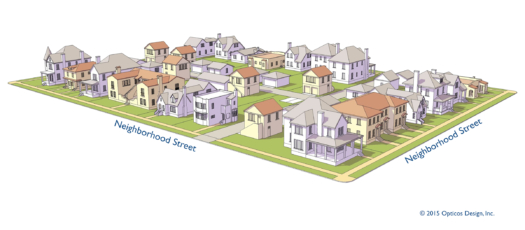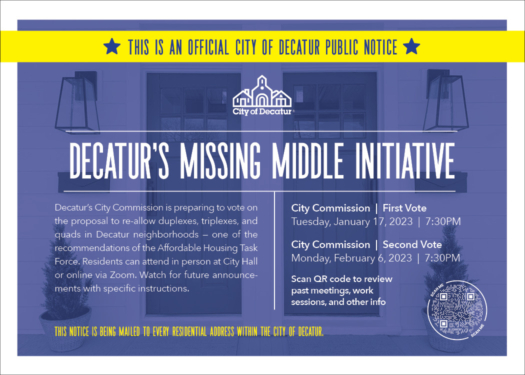Decatur creates a pathway for more middle income earners to find housing within city neighborhoods
Responding to challenges that are no longer applicable, the City of Decatur outlawed duplex, triplex and quadplex construction in residential neighborhoods in 1988. For the next 30 years thereafter, through demolition or conversion to single family homes, 407 units — the type of units particularly well suited to working singles, artists, young couples, and seniors — were lost.
In 2019, the Decatur City Commission created the Affordable Housing Task Force and appointed twenty-six community members to serve. Their charge was direct: research and develop recommendations for new policies, programs, and initiatives for the creation and preservation of affordable and workforce housing in the City of Decatur.
The result was the Affordable Housing Task Force Report, presented in February 2020, which included a specific recommendation to once again allow for compatibly-scaled multifamily structures — often referred to as “missing middle” housing — that once contributed so seamlessly to the diverse character of our historic neighborhoods.
The plan’s 23 recommended actions overall were subsequently included in Decatur’s 2020 Strategic Plan and added to the city’s to-do list for the next decade. In 2022, the City Commission made the restoration of missing middle housing a priority for the year.
For seven months thereafter, city staff conducted a variety of community outreach and engagement activities to answer questions and help residents understand the specifics of the proposal:
1) to once again allow for duplex, triplex, and quadplex conversion or construction in residential neighborhoods so long as those structures adhere to the same massing, setback, coverage, tree, and stormwater regulations that govern single family homes; and 2) that up to half of the one parking space per dwelling requirement can be satisfied via on-street parking so long as it’s available and allowed.
The proposed modifications to Decatur’s Unified Development Ordinance made their way through the state-mandated public review process beginning in the Fall of 2022. In February 2023, the City Commission made its final vote in favor of the initiative. It will become an active option for residents and developers beginning July, 2023.


